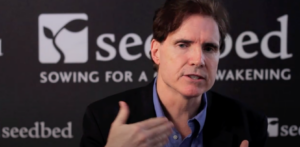This message was delivered this week at the organizational meeting of the Wesleyan Covenant Association, a group poised to advocate for a strong, orthodox, Spirit-led, global movement of United Methodists. I post this here as an invitation for you to join us in Chicago on October 7th.
Abraham and Isaac stun me. Because I’m a parent.
I have one daughter, and I am fairly convinced she is the one who hung the moon. If you’re a parent, you get this. Parents have a kind of insanity when it comes to our kids. We will take a bullet for them without thinking twice. And will do it again the next time. We will walk into the thick of a Hell’s Angel gathering to snatch our child up and take him home without breaking a sweat. We’ll go without food if it means she will get a better education.
Our children can make the worst possible mistake, but the next time they cuddle up next to us on the sofa and tell us they’d rather spend an evening with us than their friends, parental amnesia sets in. The slate wipes clean. In a way, it is like being possessed. A parent’s love is different. It is fierce. So when Abraham chooses to obey God and take his son up a mountain to make a sacrifice out of him … well, there is no other story in the whole story of God that shows more profoundly what real faith looks like.
No other story more vividly paints what God is asking of us when he asks us to have no other gods before him. No other story makes so plain what God means when he tells us to love him with all our heart, all our soul, all our mind, all our strength. Because Abraham is possessed. He is a hundred-year-old man who finally has a boy of his own. He has parental insanity. And knowing that … knowing what he is asking of this man … God comes to Abraham and says, “I am going to make you into something great. You will be the father of many people. What you have in this boy, you will have in more children than you can count. But to get there, you and I have to walk through a valley together and to you it may feel like the darkest kind of valley. That valley will lead you to the point of laying down your deepest earthly loves so there is nothing left between us, so I can pour all my hopes for the world through your family line.
“Abraham,” God seems to say, “This is what faith means. It is a decision to believe when it doesn’t make sense, accompanied by a love so fierce that nothing can compromise it.”
Can I say that again? Faith is a decision to believe when it doesn’t make sense, accompanied by a love so fierce that nothing can compromise it.
This is the brand of faith God is asking of Abraham when he tells him to kill his son and burn the boy’s body. And after you’re given those kinds of instructions, there isn’t a whole lot left to be said. Abraham takes his son and a couple of servants and begins climbing that mountain. For three days they walk together.
Can you imagine what that walk must have felt like for a man who waited decades for a boy of his own? Who would take a bullet for his son? Who would have gladly taken his son’s place in that moment?
Can you imagine?
Brothers and sisters, this is what it means to make an affirmation of faith. This is a far, far cry from, “Please stand and turn in your hymnals to #881…” This is different. This faith has the quality of gold in fire. This is the quality of faith on which God wants to build a people. Isaac wonders just where the sacrifice is coming from and Abraham, with the full weight of mature, history-shaping faith on his shoulders, stands between Isaac and God and proclaims: “The Lord himself will provide.”
The Lord will provide.
With that line, Abraham shows us the difference between a people-centered faith and a Person-centered faith. Abraham walks with his son, but he trusts in God.
Brothers and sisters, I have to confess that it has taken me a while to be able to stand among my peers and say to you that I want to walk with you while I trust in God. And I have to confess this because a few of you know where my heart has been. Somewhere along the way (I am pretty sure it was the Tampa General Conference) I misplaced my heart for the United Methodist Church. That General Conference was the first time I’d heard the proposal that maybe American Methodists ought to separate from the rest of the world for the sake of better accommodating the culture. I could not fathom not being part of a global church, so I decided that the day the U.S. broke off from the global church I would cease to be a United Methodist. That was my line in the sand.
Isn’t it ironic that the enemy of the global church is universalism? Which I suspect is the root of all our other issues.
The global church was my line and so for four years I have been looking for an exit door. I was pretty sure I’d find it at this year’s General Conference but then that thing happened that no one expected.
God showed up at General Conference, and it was the global church that exposed Him.
On the Sunday after General Conference was over — as I began to synthesize the pieces of that historic gathering — it dawned me with a heavy contrition that God might actually care about the global Body of Christ and God might even care about the place of the United Methodist Church within the Body of Christ. And most humbling of all, it dawned on me that God might have done a new thing in that Body and I didn’t see it coming.
I am confessing that I didn’t believe God was big enough to change the tide of a denomination. I under-estimated His capacity to make a way in the desert. It never occurred to me that there might be a ram in the bush. I had to repent and I had to lay my exit door up on the altar. Instead of looking for a door out, I had to look for where the gap is in my own faith that has kept me from being able to see the great moves of God.
Now, I am not blind to the things that have happened since General Conference but I have come to suspect that maybe God’s heart breaks for things I’m not even praying about yet. And maybe this is why God has me walking up that mountain with Abraham. It is to remind me that God’s ways are not our ways, God’s thoughts are not our thoughts. I won’t get to the mind of Christ with people-centered faith.
Those of us who work for renewal within our denomination do so because we believe deep in our spirits that the people we like and the people we have feelings for and the people for which we have great compassion and the people we want to see living holy lives and the people we want to see in Heaven are NOT the authors of our faith.
The author of our faith is Jesus Christ.
We have a Person-centered faith, not a people-centered faith.
Hear me: we love people! We are passionate about the things that break God’s heart and people in need of mercy break God’s heart. But to have anything at all of value to offer to people — any people — we have to go through the heart of God. Otherwise, we’ll land short of the Kingdom.
This is the brilliance of Abraham’s brand of faith. He is unwilling, even for the suffering required, to stop short of the call of God. He isn’t willing to make choices rooted in emotion, comfort or convenience. There is no “spare sheep” in his backpack, no “contingency ram” in the trunk of his car. If he wants to get to the ram in the bush, he has to walk all the way up that mountain with his boy.
At the top of that mountain Abraham and Isaac build the altar together. We all know Isaac is a young man at this point (not a little boy) and his father is at least 120. Isaac could have muscled his way out of this if he’d wanted to. But Isaac is his father’s boy. He has his father’s spiritual DNA coursing through his veins. He is the second generation of a breed of people whose faith is centered on the person of God and not on personal tastes.
Isaac is not about to let go. He is in this until God shows up, walking with his father but trusting God.
That’s the sacrifice. What Abraham and Isaac lay up on that altar is their glorious faith. It is their faith they are about to set on fire! And I don’t know what would have happened if it had gone up in flames, but it didn’t. In the last moment, just as Abraham raises his knife against his own child, God calls to him. “Abraham, I see your faith,” God cries out. “I see your faith! I see that you fear God, that you’ve withheld nothing from me. All I ask is that you worship me with all your heart!”
And so they do. Abraham and Isaac together pull a ram from its place in a thicket and they offer it to the Lord, calling upon his name: Jehovah Jireh. The Lord Provides. And Abraham declares: “On the mount of the Lord, it shall be provided.”
And that, brothers and sisters, is how it goes in the Kingdom of God. Nothing is what it seems. To get life, we have to lay it down. To be first, we have to be willing to be last. To love people we have to love God more. To save anything, we have to be willing to lay it up on the altar.
And this summer, since General Conference and living in community with my people, this is where God has had me. He has had me steeping in questions inspired by the father of our faith. These questions seem like a good place to begin as we consider the future — where God is taking us as a church, as pastors, as followers of Jesus, as the people of God:
Is your faith Person-centered or people-centered? Do you need to repent at any level for practicing people-centered faith?
What about the quality of your faith? Do you have ram-in-the-bush faith? Do you have faith enough to see the great moves of God?
What are the deepest earthly concerns you need to lay down so there is nothing left between you and Jesus?








